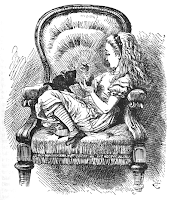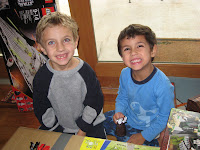 (which unfortunately was about 3 hours ago), the first thing I noticed was the cover. On my edition, it appears to be a man behind a chain-link fence with a vacant expression. My mind immediately wandered to the animal ethics PETA display that we attended yesterday. I thought of the hand of a person grasping a chain-link fence compared to the hand of a chimpanzee's hand in the exact same position. Between the two pictures was the word "imprisoned." This image really stuck with me and now as I look at this cover of the book I'm seeing the ethical dilemma at hand. Should androids with extreme intelligence (almost human, one would say) be treated as robots or as humans?
(which unfortunately was about 3 hours ago), the first thing I noticed was the cover. On my edition, it appears to be a man behind a chain-link fence with a vacant expression. My mind immediately wandered to the animal ethics PETA display that we attended yesterday. I thought of the hand of a person grasping a chain-link fence compared to the hand of a chimpanzee's hand in the exact same position. Between the two pictures was the word "imprisoned." This image really stuck with me and now as I look at this cover of the book I'm seeing the ethical dilemma at hand. Should androids with extreme intelligence (almost human, one would say) be treated as robots or as humans? Going along with this, I noted that the excerpts from "The Nature of Emotional Intelligence" raised some questions for me regarding the nature of humans vs. androids. Goleman states that "empathy builds on self-awareness," (Course Anthology 275C) and if they aren't taught emotions upon their creation, then they will certainly seem to "lack feelings altogether" (Course Anthology 275A). Thus, androids seem much like people with alexithymia because of their inability to express emotions. Is it fair to kill them simply on this basis? I've noticed that all sorts of discrimination occurs in Do Androids Dream of Electric Sheep? First, obviously, would be the androids themselves. They are hunted simply because they supposedly lack emotional intelligence. However, the test that determines this has been proved ineffective. Androids, to me, seem like children uneducated in feelings and empathy. So, Dick is said to stress "the importance of emotion, 'which in his view made men human,'" but what if androids can learn emotions based on education and simply observation? Then, would it be fair to discriminate against them? The ethical dilemma here is clearly that androids could possibly feel human emotions, and yet they are treated as different.

Plus, ordinary humans like Rick and his wife Iran, have machines that stimulate emotions. If feelings and emotion are what set apart the humans and the androids, then this is blatant contradiction to the barrier between androids and humans. Another ethical dilemma (again involving discrimination) would be the "specials." Specials, like Isidore, are humans as well, just slightly below the average IQ. He seems perfectly up to par on societal values, such as his vivid description and extensive knowledge on "kipples." Also, he treats the new inhabitant of his apartment building with politeness and friendliness. As far as I could tell, he treated her with the kind of c
 ourtesy I would expect from any normal person, so it seems unfair that he is of lower status and has fewer rights that non-specials, or regulars. Also, I noticed a slight discrimination against women. For example, when Rick is setting his wife's mood organ he puts sets her to "pleased acknowledgment of husband's superior wisdom in all matters." However, Iran seems to have more insight in life than Rick. She is the one who can almost feel sadness and fights the new order in which they love, such as the perpetual need to watch TV. Thus, women are treated as lower in this new regime, which is yet another form of discrimination.
ourtesy I would expect from any normal person, so it seems unfair that he is of lower status and has fewer rights that non-specials, or regulars. Also, I noticed a slight discrimination against women. For example, when Rick is setting his wife's mood organ he puts sets her to "pleased acknowledgment of husband's superior wisdom in all matters." However, Iran seems to have more insight in life than Rick. She is the one who can almost feel sadness and fights the new order in which they love, such as the perpetual need to watch TV. Thus, women are treated as lower in this new regime, which is yet another form of discrimination. Ethical dilemmas, however, extend beyond those between humans. Moving on to animals, we see that in this new world, animals are finally valued as something extremely precious. As I think about this, I am reminded of Tennyson's quote "'Tis better to have loved and lost than never to have loved at all." I am so glad that I can appreciate animals and form relationships without the constant fear of how rare they are. I would much rather have animals in my life than to live in the world of Do Androids Dream of Electric Sheep, in which animals are regarded as creatures of extreme importance and are hard to obtain. We must regard animals now with love and compassion. In this book, I see how animals are scarce and many that we take for granted today (raccoons, for instance) are even extinct.

I wish that people could realize what they have now and appreciate animals. My eyes have been opened up to what things could be like. I realize that all animals are special and that there could exist a world where ordinary animals are scarce. I only wish that others could treat animals with more respect and compassion than they currently do.
Dick's book Do Androids Dream of Electric Sheep addresses very different aspects of ethics. Ethics among humans and ethics between humans and animals. Nonetheless, the issues raised are important and eye-opening. We realize that in a new order after chaos, people are more likely to treat each other with discrimination. However, we also see that things that were once plentiful and are now scarce, such as animals, are placed on a much higher scale of importance.

















